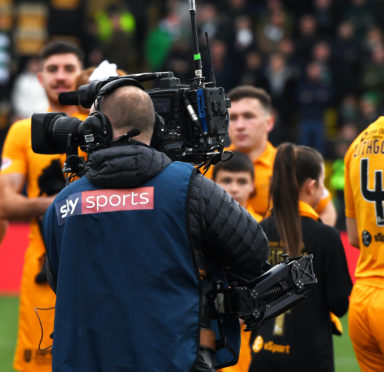Scottish football’s new TV deal with Sky received the kind of welcome reserved for a drunken uncle at a wedding reception.
Many fans were outraged at the decision of the SPFL to accept the satellite company’s bid, which we’re told was well in excess of the offer from BT Sport, who have 18 months of their current contract left.
There is general agreement that BT are more enthusiastic and knowledgeable about the game here, and promote it better.
The clubs though want the money. It’s that simple. The costs of running professional football clubs are very high, and TV income is an irreplaceable part of the earnings which help keep the lights on.
Had it been a matter of a few pounds, it might have been a different outcome, but it seems that BT, having stretched itself for Champions League rights sometime ago, weren’t prepared to push the boat out for Scottish fare.
Football is a business. The harsh financial realities of the game mean that the highest offer wins.
False comparisons with other countries are pointless. We’re trying to sell our own game, not that of Sweden or Switzerland.
There’s a limited market for the game. Those who think otherwise are fooling themselves. If it were otherwise, we would be flooded by offers, and we’re not.
Companies are looking for a return on their investment. Sky presumably, think they can get one where others didn’t.
Fans are the first to complain if a star player is sold for a fee which they think doesn’t reflect his value, so those running football have to seek the best deal when selling our game.
Football sold its soul a long time ago and we’re all complicit in it.
Hands up those who don’t watch a game on television? Very few of us fall into that category.
Live football and the money it brings, has been integral to the game for a very long time. It’s a part of the furniture and we won’t be redecorating without it any time soon.
That extra revenue from the broadcasters provides the extra money to pay the wages which better players can demand, and so it becomes a vicious circle. Supporters want to see the best possible players and that costs money.
Income from the gates and season ticket money doesn’t pay the costs. It’s a mutual effort. Both fans and broadcasting revenue are required to present a decent show on the pitch.
If clubs tried to live on what was coming through the turnstiles alone, the crowds would drop as the quality on show diminished because the revenue to attract better players wouldn’t be available.
It’s not an either/or choice. Football in Scotland needs paying fans and it also needs paying TV subscribers.
It’s easy to talk glibly about doing without a TV deal if you don’t have to meet the commitments to players’ wages and running costs.
The modern game in Scotland as currently organised cannot survive without TV cash.
That might not be the song that the fans want to hear, but as the old saying goes, he who pays the piper calls the tune.
